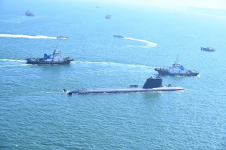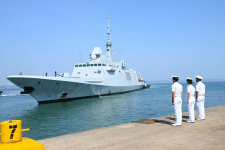jan.09.25_thediplomat
Why France Is India’s Best Bet for Building Nuclear-Powered Submarines
By
Rahul Mishra and
Harshit Prajapati
The acquisition of SSNs represents a significant step in enhancing India’s deterrence in the Indian Ocean. But India will need help in the endeavor, and France is the most attractive partner.
China’s expanding presence in the Indian Ocean Region (IOR) has been marked by an uptick in the
deployment of submarines and the frequent visits of Chinese surveillance and research vessels. These vessels, ostensibly engaged in scientific exploration, often gather crucial seabed data to facilitate Chinese submarine operations, presenting a strategic challenge for India.
Nuclear-powered submarines (SSNs), with their superior endurance and operational range enabled by nuclear reactors, provide a robust platform for countering such activities. SSNs are pivotal for enhancing India’s maritime capabilities in the Indian Ocean Region, where India’s geographical advantage gives it an edge over China.
However, India’s current submarine fleet is
dominated by conventional submarines, which are limited in range and endurance. The existing fleet of nuclear-powered ballistic missile submarines (SSBNs) is reserved primarily for nuclear deterrence. To address this gap, SSNs are an essential addition, particularly as neighboring countries like Pakistan and Bangladesh also augment their submarine capabilities.
In October 2024, India made a decisive move by
approving a project to construct two nuclear-powered submarines and eventually expand this fleet to include four more. This decision underscores the increasing urgency felt by the Indian Navy to bolster its capabilities, particularly in response to the growing strategic challenge posed by China in the IOR. The acquisition of SSNs represents a significant step in enhancing India’s deterrence and operational range in a region where its influence is critical and contested.
Regional Dynamics and the Role of AUKUS
Geopolitical tensions stemming from the intensifying rivalry between the United States and China have accelerated the pace of military modernization in the region. The AUKUS agreement, which aims to equip Australia – India’s Quad partner – with SSNs, exemplifies this trend. Further, other Indo-Pacific countries, such as Indonesia and Malaysia, are also aiming to bolster their submarine fleets. In March 2024, Indonesia signed an agreement to
acquire two Scorpene-class submarines from France, and Malaysia
intends to acquire two more submarines under its 14th and 15th Malaysia Plans (2031-35 and 2036-40).
Closer to home, Pakistan’s acquisition of Hangor-class submarines and Bangladesh’s procurement of
Ming-class submarines – both purchased from China – highlight a regional arms buildup that necessitates India’s response. The first of eight
Hangor II submarines for Pakistan was launched at the Wuchang Shipbuilding yard in Wuhan, China in early 2024.
The proliferation of advanced submarine technology among regional actors underscores the necessity for India to develop SSNs to safeguard its interests in an increasingly complex strategic environment.
The Indian Navy plans to
construct the SSNs at the Ship Building Center in Visakhapatnam. The complexity of SSN technology, which combines advanced propulsion systems, stealth capabilities, and high-endurance features, poses a formidable challenge to India’s nascent defense-industrial base. Historically, India has relied on foreign assistance for such projects. For instance, India’s SSBNs were developed with significant Russian support, and the country has previously leased
Akula-class SSNs from Russia. However, the geopolitical fallout from the Russia-Ukraine war and the accompanying sanctions on Russian entities have disrupted defense collaborations, causing delays in ongoing projects. Payments for a new lease agreement signed in 2019 have been stalled, with the project unlikely to be completed before 2028.
These challenges highlight the urgency of diversifying India’s defense partnerships.
France: A Reliable and Strategic Partner
France has emerged as a pivotal partner in India’s defense landscape. According to the Stockholm International Peace Research Institute (SIPRI),
France became the second-largest global arms exporter in 2024, with India being its primary customer. This reflects a shift in India’s defense procurement strategy, which aims to reduce over-reliance on Russia. Between 2009 and 2023, India’s defense
imports from Russia dropped dramatically, from 76 percent of India’s total from 2009-2013 to 36 percent from 2019-2023. This strategic pivot aligns with India’s broader goal of diversifying its defense imports, making France an ideal collaborator for the SSN project.
The France-India strategic partnership, established in
1998, has deepened significantly over the past decade. France stood by India in 1998 when many Western nations, including the United States, imposed sanctions in response to India’s nuclear tests. This history of political reliability and mutual trust is a cornerstone for any collaboration involving sensitive defense technologies like SSNs.
Advanced Technology and Joint Development
France has
proposed sharing advanced technologies, such as pump-jet propulsion, which enhances the stealth and efficiency of submarines. This proposal reflects France’s willingness to engage in meaningful technology transfer, a critical factor for India as it seeks to develop indigenous defense capabilities. The first of India’s six planned SSNs may feature French pump-jet technology, while subsequent models could incorporate Indian-designed propulsion systems once these have been tested and validated.
The
French Suffren-class SSNs, also known as the Barracuda class, renowned for their low noise signature and advanced nuclear reactors, offer significant advantages over India’s existing submarine capabilities. For instance, the nuclear reactors proposed for these submarines are rated at 190 MW, compared to the 84 MW reactors used in India’s SSBNs designed with Russian assistance. This substantial improvement in reactor power translates into greater operational range and endurance, which are essential for India’s strategic objectives in the IOR.
India’s defense-industrial ecosystem stands to benefit from its long-standing collaboration with the French Naval Group, the manufacturer of Suffren-class submarines. The Naval Group previously partnered with Indian firms to co-produce Scorpene-class submarines, which incorporated several Indian components. For example, the integration of an Indian-developed air-independent propulsion system and combat systems supplied by Bharat Electronics Limited (BEL) demonstrates the success of this collaboration. These experiences provide a strong foundation for the co-production of SSNs, aligning with the Indian government’s vision of greater domestic participation in defense manufacturing.
France’s Commitment to India’s Defense Modernization
France has consistently expressed its willingness to support India’s SSN program. In 2017, then-Indian Naval Chief Sunil Lanba visited a French shipyard to examine the Suffren-class SSNs. More recently, during Prime Minister Narendra Modi’s
visit to France in July 2023, the two nations released the “
Horizon 2047” document, outlining ambitious plans for defense collaboration, which includes building India’s submarine fleet. French Ambassador to India
Emmanuel Lenain reaffirmed France’s commitment to delivering cutting-edge defense technologies without restrictions, emphasizing the depth of trust between the two nations.
The political trust between India and France, reinforced by decades of reliable collaboration, makes France the most suitable partner for building SSNs. Unlike other Western nations, France has consistently demonstrated a willingness to share critical technologies and adapt to India’s specific defense needs. The Naval Group’s expertise in advanced submarine technologies, combined with India’s growing industrial capabilities, creates a synergistic partnership that promises to deliver world-class SSNs.
Conclusion
In an era of shifting geopolitical alignments and intensifying great-power competition, the partnership between India and France stands out as a model of trust, reliability, and mutual benefit. The construction of SSNs represents a critical milestone for India’s defense capabilities, addressing both immediate strategic challenges and long-term security needs. France’s proven track record in advanced submarine technology, combined with its willingness to engage in meaningful technology transfer, makes it an indispensable partner for India’s SSN program. As both nations work together to navigate the challenges of the 21st century, their collaboration on SSNs will serve as a testament to the strength and resilience of their strategic partnership.
/end
(i wish u all a happy new year)



















